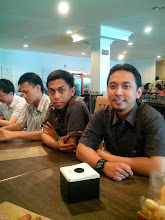- Active Sentences
Active sentence is a sentence that the
subject is doing the job or In active sentences, the thing doing the action is
the subject of the sentence and the thing receiving the action is the object.
Most sentences are active.
The formula:
- Subject +
Main Verb + Someone + Verb Word
Examples from Active Sentences:
- His mother made him take his medicine
- Let's get Ralp to go whit us
- He was helping me type my paper
- My English teacher had us give oral reports
- His mother let him go to school
- Right now,
Sarah is writing the letter
- George had repaired many cars before he received his mechanic's license.
- Sam repaired the car
- Jerry used to pay the bills
- Passive Sentences
Passive
sentences is that the subject is the sentence shall be imposed with a job or a
subject, or in passive sentences, the thing receiving the action is the subject
of the sentence and the thing doing the action is optionally included near the
end of the sentence. You can use the passive form if you think that the thing
receiving the action is more important or should be emphasized. You can also
use the passive form if you do not know who is doing the action or if you do
not want to mention who is doing the action.
The formula:
-
[Thing receiving action] + [be] + [past participle of verb] +
[by] + [thing doing action]
Examples from Passive Sentences:
- His mother made his madicine taken by him
- Let's get out car fixed
- He helped my paper typed
- My English teacher had oral reports given
- His mother am letting this machine checked
- Right now,
the letter is being written by Sarah.
- Many cars had been repaired by George before he received his mechanic's license.
- The car was repaired by Sam.
- The bills used to be paid by Jerry.
Article:
The sea was formed about 4.4 billion
years ago . Where it is very acid with water boils ( with the temperature of
about 100c ) because of the heat of the planet at that time . Asamnya sea water
was because at that time the earth 's atmosphere filled with carbon dioxide .
Water keasaman this is what causes the high of weathering happened that generate salt that causes salt dead sea water
into like now .
Watery vapor condensed in the
atmosphere started to rain and formed . This is the rain that fills depressions
in the earth until formed the ocean that 's why on earth began
to have water . Slowly , the amount of carbon dioxide in the atmosphere started
to rise because of the solute in sea water and reacting with an ion carbonate forming
calcium carbonate . As a result , the heavens are garnished so that started the
rays of the sun can be back in illuminative the earth and resulted in the
process of evaporation happened so that the volume of sea water on the earth
also suffered substraction and parts of the earth that originally submerged
aquatic begin to dry . The process of weathering assistance of continue due to rain and is carried
away into our oceans , causing the sea of salt .
In 3.8 billion years ago , the
earth began to appear blue because of the sea that has been formed . The
temperature of the earth the cold because the water of the sea a role in
absorbing heat energy . That 's the history of the formation of the sea , so shall
we keep of natural from the sea to our grandchildren depressions.
note:
- words that are underlined and bolded containing passive sentences









 11:19 PM
11:19 PM
 Blog-Online
Blog-Online

 Posted in:
Posted in: 





